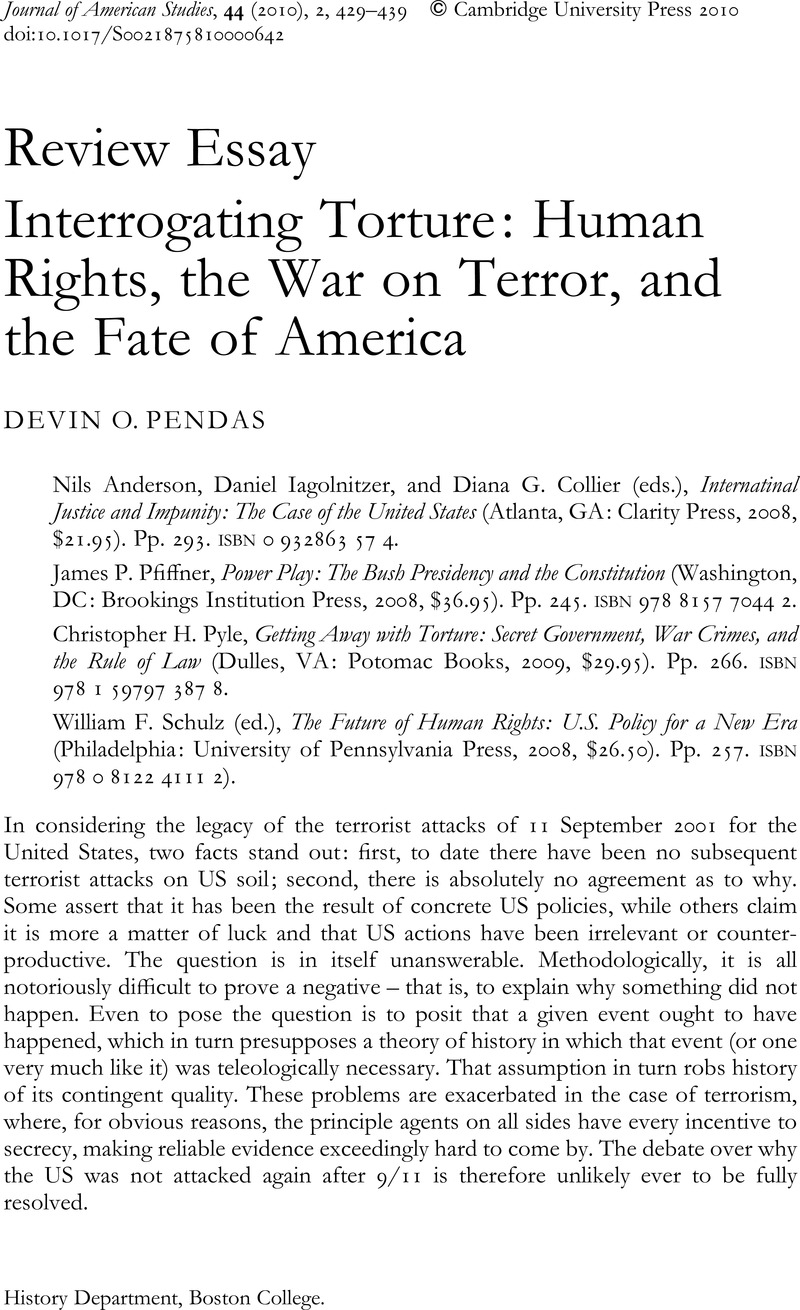No CrossRef data available.
Published online by Cambridge University Press: 23 April 2010

1 Jon Ward, “Exclusive: Cheney Defends War on Terror's Morality,” Washington Times, 18 Dec. 2008, available at http://www.washingtontimes.com/news/2008/dec/18/cheney-defends-morality-of-war-on-terror/?page=2, accessed 6 Aug. 2009.
2 See e.g. “Cheney Says Results Back US Interrogation Tactics,” Boston Globe, 26 Aug. 2009, A.6.
3 John Yoo, War by Other Means: An Insider's Account of the War on Terror (New York: Atlantic Monthly Press, 2006), 3.
4 David B. Rivkin Jr. and Lee A. Casey, “Lawfare,” Wall Street Journal, 23 Feb. 2008; and Charles J. Dunlap Jr., “Lawfare amid Warfare,” Washington Times, 3 Aug. 2007. See also Dunlap, “Law and Military Interventions: Preserving Humanitarian Values in 21st-Century Conflicts,” Carr Center for Human Rights Policy Working Papers, Harvard University (29 Nov. 2001).
5 Richard A. Posner, Not a Suicide Pact: The Constitution in a Time of National Emergency (New York: Oxford University Press, 2006), 18.
6 For a very useful analysis of the similar arguments deployed to justify the American turn to unilateralism in foreign policy after 9/11 see James E. Cronin, “Review Essay: The United States in, or against, the World,” Government and Opposition (forthcoming, 2010).
7 Ron Suskind, The One-Percent Doctrine: Deep Inside America's Pursuit of Its Enemies since 9/11 (New York: Simon and Schuster, 2007).
8 David Cole, “The Torture Memos: The Case against the Lawyers,” New York Review of Books, 56 (8 Oct. 2009), www.nybooks.com/articles.23114.
9 For an argument that the main features of President Bush's foreign policy are likely to persist even under a democratic administration see Timothy Lynch and Robert Singh, After Bush: The Case for Continuity in American Foreign Policy (Cambridge: Cambridge University Press, 2008).
10 For conservative critiques see Jack L. Goldsmith, The Terror Presidency: Law and Judgment Inside the Bush Administration (New York: Norton, 2007); and Francis Fukuyama, America at the Crossroads: Democracy, Power, and the Neoconservative Legacy (New Haven: Yale University Press, 2007).
11 For various positions see e.g. Andrew Bacevich, American Empire: The Realities and Consequences of U.S. Diplomacy (Cambridge, MA: Harvard University Press, 2002); Eric W. Robinson, “American Empire? Ancient Reflections on Modern American Power,” Classical World, 99, 1 (2005), 35–50; Akira Iriye, “Beyond Imperialism: The New Internationalism,” Daedalus, 132, 2 (2005), 108–16; Paul Schroeder, “Is the U.S. an Empire?” History News Network, 2 March 2003, available at http://hnn.us/articles/1237.html; and Charles S. Maier, “An American Empire? The Problems of Frontiers and Peace in Twenty-First-Century World Politics,” Harvard Magazine (Nov./Dec. 2002), 28–31.
12 For what remains the most trenchant critique of Lenin and Hobson see D. K. Fieldhouse, “Imperialism: An Historiographical Revision,” Economic History, 14, 2 (1961), 187–209.
13 Richard Hofstadter, The Paranoid Style in American Politics, and Other Essays (New York: Knopf, 1965).
14 See e.g., among many others, Mark Benjamin, “Is Torture Really Over?”, Salon, 17 April 2009 (http://www.salon.com/opinion/feature/2009/04/17/torture/index.html).
15 There are interesting parallels in this regard with Peter Beinart, The Good Fight: Why Liberals – and Only Liberals – Can Win the War on Terror and Make America Great Again (New York: HarperCollins, 2006).
16 He first coined the term in Joseph S. Nye Jr., Bound to Lead: The Changing Nature of American Power (New York: Basic Books, 1991).
17 Andrew Ward, “Nobel Committee Defends Obama Choice,” Financial Times, 14 Oct. 2009, available at http://www.ft.com/cms/s/0/762f7ae6-b667-11de-8a28-00144feab49a.html.